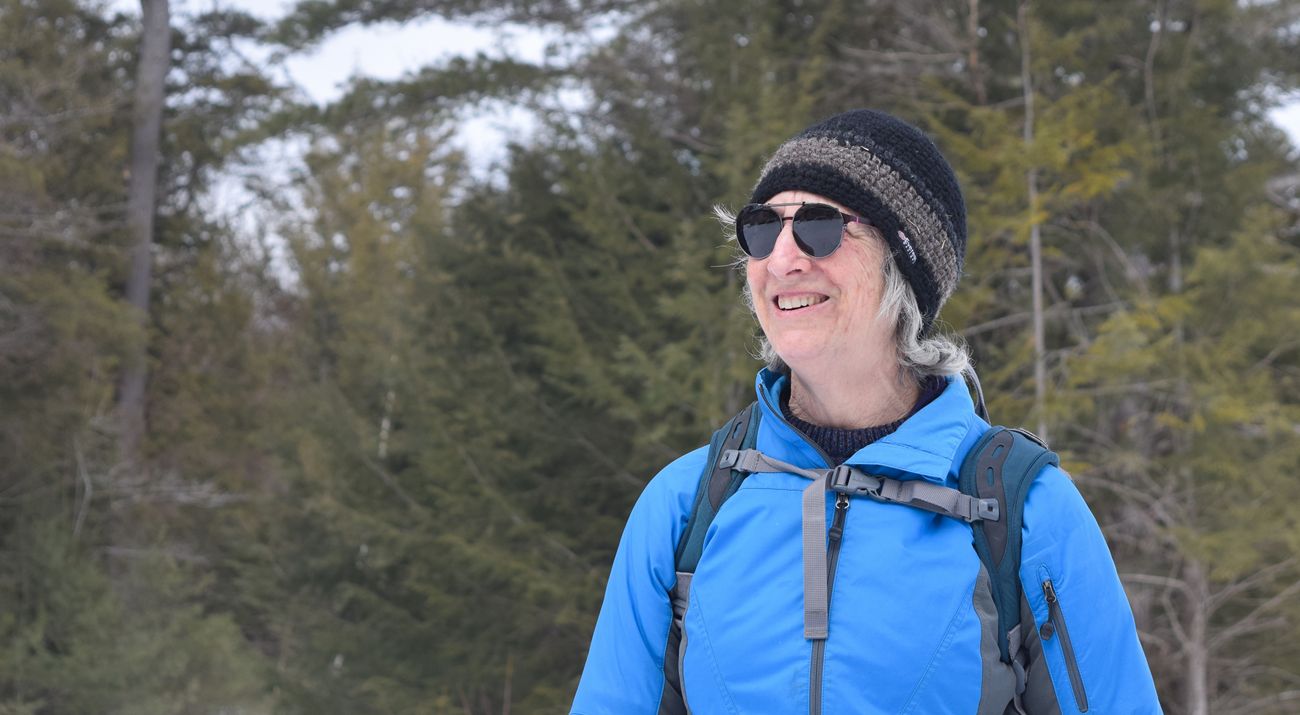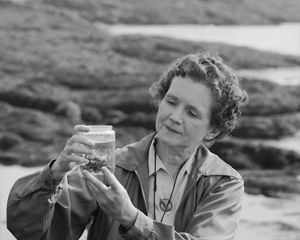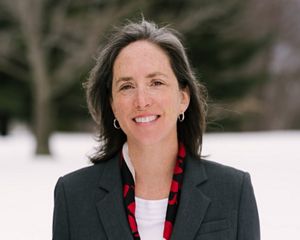Stewarding the Evolution of Conservation
Conservation has changed a lot in the last 30 years—and land manager Nancy Sferra has had a front-row seat.
Nancy Sferra understands evolution. Sure, with a master’s degree in biology, she is well versed in the concept of natural selection, but Sferra has also played a key role in another evolution over the course of her 30-year career at The Nature Conservancy—the evolution of conservation.
After studying wildlife biology and management at Eastern Kentucky University, Sferra worked in academic research and government lands management before joining Massachusetts Audubon as a field ecologist. The world of non-profit conservation really felt like a good fit and in 1991, Sferra joined TNC in Michigan as a land steward. Almost three years to the day after joining TNC, Sferra started working for the Maine chapter as the Southern Maine Preserves Manager.
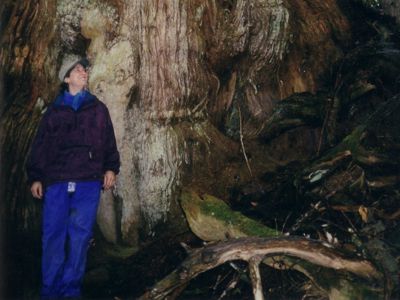
The original Southern Maine office was in a strip mall in Sanford. “It was a little lonely, but there was a whole lot to do,” remembers Sferra. “I was able to find a truck through a GM program for non-profits and then really dig into our fledgling prescribed fire work at Kennebunk Plains.”
Managing lands with fire is an important aspect of conservation management. Through diligence and a strong spirit of learning and improvement, Sferra and current Southern Maine Preserves Manager Jon Bailey have developed a top-notch fire management program that often burns on behalf of the state and trains fire crews to federal standards.
Celebrating a True Caretaker
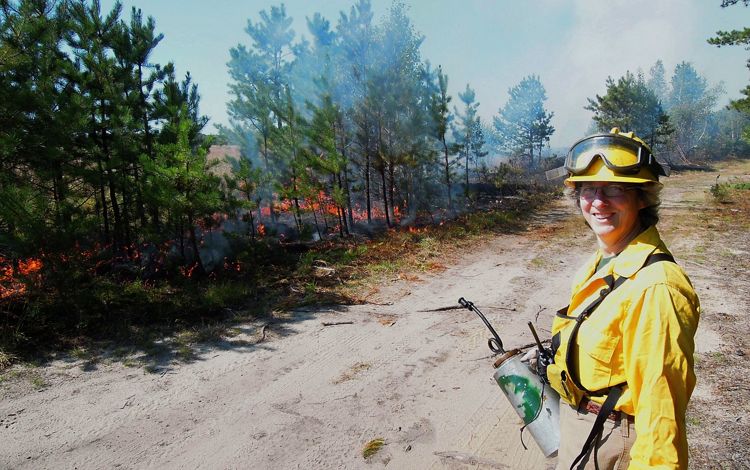





Though she enjoyed her work, Sferra started looking for ways to connect with more of the state. At about that time, a new opportunity became available, and she deservedly became TNC Maine’s Director of Science and Stewardship in 1999.
Taking conservation to a new level
And then everything changed. Just before Sferra took on this big role, in December 1998, TNC had purchased 185,000 acres along the St. John River in northwestern Maine. At the time, this was TNC’s biggest land purchase ever, anywhere in the world.
When she first arrived, TNC Maine focused its conservation efforts on rare species, like the majestic and iconic Bald Eagle. As time went by and new challenges emerged, TNC broadened its scope to include protecting natural communities and ecosystems—a wetland here, for example, an alpine zone there. A 1,500-acre preserve was very big prior to 1998. Now, recognizing that species need space to thrive, conservation was happening at a much grander scale.
“It was DAUNTING,” recalls Sferra with a chuckle. “Before the St. John project, we were protecting chocolate chips. Suddenly, we were taking care of the whole cookie.”
Quote: Nancy Sferra
Before the St. John project, we were protecting chocolate chips. Suddenly, we were taking care of the whole cookie.
TNC soon partnered with state agencies to develop Maine’s ecological reserve system. These places, left free from significant human impacts, are large enough to withstand storms, diseases, and other natural disturbances and to provide secure habitat for wide-ranging species. Ecological reserves are important to scientists studying how nature responds to challenges such as climate change, forest pests and diseases, and airborne pollution.
When reserves are connected by large, sustainably managed working forests, plant and animal species can move around the landscape as their needs require.
“Through our work in places like the St. John and the 46,000-acre Debsconeag Lakes Wilderness Area, we’ve found that any given reserve in Maine should be at least 25,000 acres,” explains Sferra. “This is more important than ever today. Studies show that plants and animals are moving 11 miles north and 36 feet higher in elevation each decade in response to the changing climate. We need to give them a place to go.”
Moving beyond land
And it’s not just forests. Recognizing that systems are not only big, but also involve interconnected habitats, TNC expanded its conservation work again to include waterways and oceans. in conservation work. Joining with partners to complete the Penobscot River Restoration Project has resulted in a multitude of benefits, including skyrocketing fish runs, renewed historic recreational opportunities, and restored connections throughout the watershed. Working with fishermen in the Gulf of Maine to develop new technologies and techniques, TNC is helping restore critical food webs—for wildlife and people.
“All of our work today promotes biodiversity, and that’s so critical for the health of both natural and human communities,” says Sferra.

A recent strategy by TNC is to use conserved lands to mitigate the causes of climate change through conservation and make our landscape more adaptable to whatever the future holds. Many species are approaching—or have already reached—the limit of where they can go to find hospitable climates. Research by TNC and partners also shows that nearly 60 percent of U.S. lands and waters are fragmented by human development, preventing species from moving naturally to find new and more hospitable habitat.
And it’s important to maintain the carbon stored in mature forests and provide the opportunity for trees to continue pulling carbon from the atmosphere to mitigate climate change.
Looking to the future
After a long and fruitful career, Sferra is retiring this spring—and handing the land management reins to former Baxter State Park director Eben Sypitkowski. They will be in good hands.
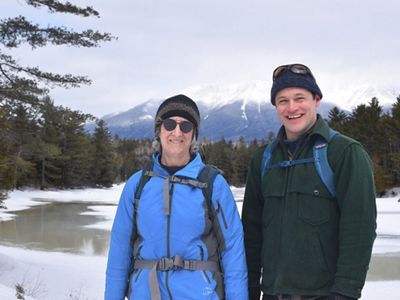
“How we take care of our natural places has never been more important than it is right now,” says Sypitkowski. “I’m thrilled to join an innovative team working for a future where Maine’s habitats are resilient and connected, and our relationships with the land and waters are deep and inclusive.”
Asked about the future of conservation at TNC, Sferra is optimistic. “TNC has a huge role to play in promoting biodiversity, and I’m confident that they’ll continue to do that,” she says. “Engaging with Indigenous and at-risk communities has also been and will continue to be an important element of conservation in Maine and beyond.”
What’s next for Sferra? She’s got a pretty long list going. “I’ll be doing some traveling around the country, maybe hike the 100-mile wilderness, and continue to play my music and work in the garden,” she says. “And volunteer with TNC…a lot!”
Support Our Work in Maine
Your support protects wildlife and their habitats, bolsters sustainable nature-based economies and inspires climate action. Please join us to ensure that Maine's natural legacy endures for future generations.
